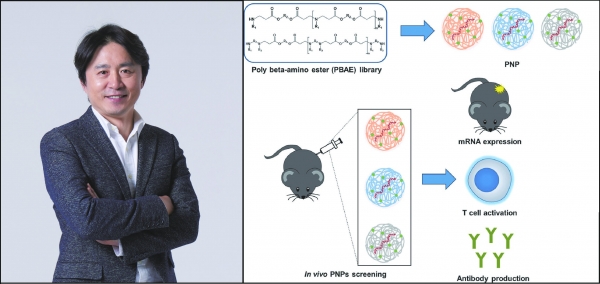
A research team led by Professor Won Jong Kim (CHEM) and the Korea Disease Control and Prevention Agency (KDCA) has developed a biodegradable polymer-based carrier that could deliver mRNA efficiently. This research was recently published in Biomaterials.
After the COVID-19 pandemic, the potential of mRNA vaccines has gained a lot of attention. Lipid nanoparticles (LNPs), which have been mainly utilized in previous vaccines, have fatal weaknesses although they have high delivery efficiency. LNPs spread throughout the body after injection move to the liver, where they are accumulated and cause toxicity and serious side effects, such as anaphylaxis, by excessive immune response.
Hence, the research team used a biodegradable polymer called Poly β-amino ester (PBAE) as an alternative. PBAE is safely degraded inside the body and has already been used as a carrier for siRNA, DNA, and mRNA. During this research, the team synthesized 55 types of PBAE polymers and designed new polymer nanoparticles using them.
As a result, the team was able to develop a polymer with enhanced mRNA delivery efficiency over existing LNPs. It was also shown that mRNA expression also lasted for more than four weeks at maximum, which clearly surpasses the average lasting period of LNP function of five days. Moreover, mRNA expression was only found at the injection site when using this newly developed polymer, and toxicity was not observed in the liver.
Immune response experiments also showed that this polymer has effectively induced T cell immune activation, and it was found that the polymer had a similar level of performance with the existing LNPs in a neutralizing antibody formation for COVID-19. These results suggest that the polymer-based carrier, with both safety and efficiency, could be widely used not only in next-generation mRNA vaccines but in the development of gene therapy.
Prof. Kim explained, “While previous LNP-based carriers had a short functioning period and were hard to be used in therapy, the new polymer-based carriers are suitable for mRNA delivery for treatment since it lasts up to one month.” He added, “This research has a significant implication in that original polymer materials were developed, which can replace LNP patents preoccupied with foreign technologies.”
This study was supported by an initiative of the National Institute of Health (NIH) and a research project grant from the National Research Foundation of Korea (NRF) funded by the Ministry of Science and ICT.


